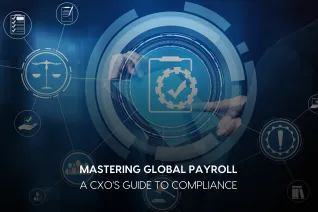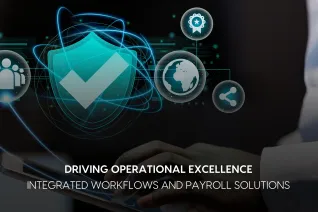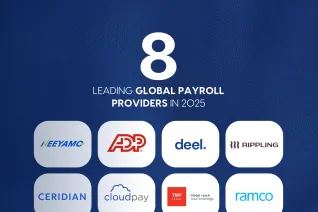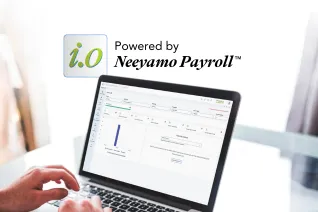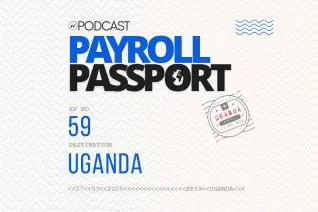Country Spotlight: Payroll in Ghana

Did you know that Ghana is home to not only the world’s largest artificial reservoir, Lake Volta but also to a complex payroll ecosystem? Like Lake Volta, which supports livelihoods, powers the nation, and sustains life, managing payroll in Ghana requires a delicate balance of compliance, accuracy, and local insight.
Payroll management isn't just a mundane operational task for businesses, especially for multinational companies entering this dynamic market. It is the bedrock of fostering trust, ensuring compliance, and sustaining growth. But why is it so challenging to manage payroll in Ghana effectively? Let’s delve into the intricacies and highlight why expertise is non-negotiable.
What are the foundations of Ghana Payroll?
Every payroll process in Ghana begins with employee registration. Employers are required to gather critical information such as Tax Identification Numbers (TINs) and Social Security numbers. Registration involves:
- Ghana Revenue Authority (GRA): For tax purposes.
- Social Security and National Insurance Trust (SSNIT): For social security contributions.
- Private Fund Managers: For Tier 2 and Tier 3 pensions.
This comprehensive registration ensures employees are accounted for in Ghana’s financial ecosystem while providing a safety net for their future.
Payroll taxes in Ghana are shared between employers and employees, reflecting a balanced approach to welfare contributions. Income taxes for employees are progressive, ranging from 0% to 30%, depending on earnings.
Payroll timing is another critical component in their system. Ghana primarily operates on a monthly payroll cycle, with salaries required to be disbursed by the last working day of the month. While some employers adopt bi-weekly payments for convenience, it’s essential to maintain consistency and ensure timely processing. Unlike some other countries, Ghanaian labor laws do not require employers to provide a 13th-month salary.
ALSO READ I Ghana: A Guideline to Payroll and Employer of Record
Ghana Leave and Benefits: Ensuring Employee Well-Being
Ghana’s labor laws demonstrate a strong commitment to employee welfare, especially through its leave policies. For instance, workers are entitled to 15 working days of paid annual leave after completing a year of continuous service. This ensures employees have adequate time to rest and recharge, contributing to a healthier and more productive workforce. Understanding these entitlements is key for any company looking to work in Ghana.
Maternity leave policies in Ghana are particularly noteworthy, offering one of the most employee-friendly arrangements in the region. Women are entitled to 12 weeks of fully paid maternity leave, with an additional two weeks for multiple births or complications. Nursing mothers also receive an hour of paid breaks each day for up to a year. These provisions reflect Ghana’s dedication to supporting working mothers, promoting gender equality, and fostering inclusive workplaces.
The Importance of Record-Keeping and Reporting
Employers in Ghana have specific reporting requirements for various government agencies:
- Tax Reports: Monthly and annual tax reports must be submitted to the Ghana Revenue Authority (GRA).
- Social Security Contributions: Regular contributions to the Social Security and National Insurance Trust (SSNIT) must be reported.
- Pension Contributions: Tier 2 and Tier 3 pension contributions need to be reported to the relevant private fund managers.
- Employee Payroll Records: Maintaining detailed payroll records for at least 12 years is mandatory.
Following these reporting requirements ensures transparency and adherence to Ghanaian tax and social security regulations.
What are the challenges encountered in Ghana’s Payroll Landscape?
Ghana’s payroll regulations, though intricate, are designed to balance the interests of employers and employees. From progressive tax rates to inclusive hiring practices, the system promotes fairness and compliance.
However, managing payroll can be challenging for organizations unfamiliar with Ghana’s specific requirements.
Despite Ghana’s robust regulatory framework, managing payroll in the country comes with its fair share of challenges. The progressive tax system, while fair, requires meticulous attention to ensure calculations are accurate and up to date. Any misstep in deductions or contributions can lead to financial penalties or employee dissatisfaction. Similarly, the multi-tier pension system adds a layer of complexity, as employers must manage contributions across various schemes while meeting reporting deadlines.
Given these complexities, it’s clear that payroll management in Ghana is not a task to be taken lightly. The stakes are high, and the risks of non-compliance can be severe. This is why businesses must prioritize expertise, either by building an in-house payroll team with local knowledge or partnering with a global payroll provider with experience in Ghana’s regulations. In addition, companies need to be aware of regulations related to hiring and work in Ghana, including employment contract requirements.
That’s where global payroll solutions like Neeyamo come into play.
TUNE IN: Payroll Passport Ep 40. Ghana
Why choose Neeyamo for your Global payroll needs?
Unlock the power of seamless global payroll management with Neeyamo's expert global payroll services. Neeyamo helps you navigate complex payroll regulations in 160+ countries, ensuring compliance and minimizing risks. Not convinced yet? Here's why we're your ideal partner:
Regulatory Roadblocks? Confidently navigate complex international laws & regulations.
Irritated with Integration? Seamlessly stitch together your HR systems.
Chaotic Control? Command your global workforce from a single platform.
Tardy Transactions? Ensure prompt and precise payroll processing.
Doubtful Digital Defense? Shield your sensitive information from digital threats.
Neeyamo? Your passport to hassle-free global payroll!
So, as you embark on your global business venture, remember - a happy and well-compensated workforce translates to a thriving business! To know more, contact irene.jones@neeyamo.com
Latest Resources
Stay informed with latest updates
If you're curious and have a thirst for knowledge pertaining to the HR, payroll, and EOR universe, don't miss out on subscribing to our resources.








